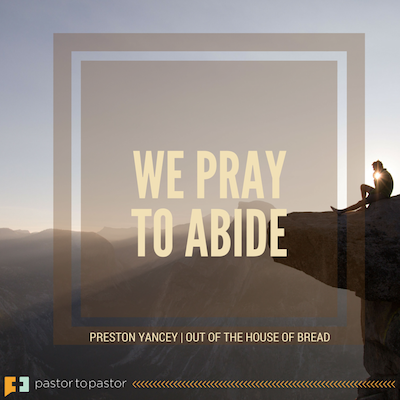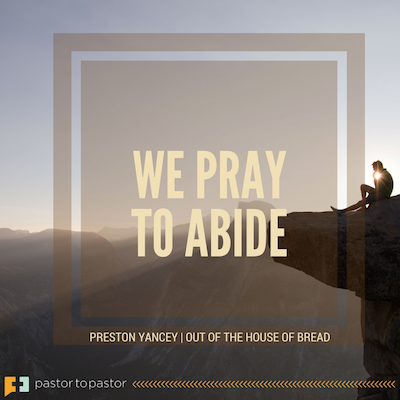 Our growing concerns over nominal Christians will not be mitigated by the next trend or new approach, but in the discipleship and equipping of the saints in our midst. They, in turn, will go out into the world to disciple and equip new saints. This is how we will see revival. Not revival that is emotional and fleeting, but abiding. How do we teach people to abide? If we do anything, let us teach people to pray often and to pray well.
Our growing concerns over nominal Christians will not be mitigated by the next trend or new approach, but in the discipleship and equipping of the saints in our midst. They, in turn, will go out into the world to disciple and equip new saints. This is how we will see revival. Not revival that is emotional and fleeting, but abiding. How do we teach people to abide? If we do anything, let us teach people to pray often and to pray well.
Of the many answers to be given about why we pray, perhaps most important and fundamental is that we pray to abide. The psalmist says that God is “the rock that is higher than I … a sure foundation.” Prayer anchors us to that rock. Prayer keeps our hearts and imaginations open to recognize the work of God in ourselves and in our world. The late medieval rhetorician, Bernard of Clairvaux, described the trajectory of faithfulness as beginning in love for yourself for your own sake—selfish love—but through the work of the Holy Spirit and a life of devotion ending in love for yourself for God’s sake—union with God. For Bernard, the goal of the Christian life was to see as God sees, to love the whole of the creation, even yourself, as God loves. The love of God, we know, is complicated. The love of God does not ignore sin or injustice. The love of God is righteous and convicting. Prayer keeps us open, pushes us deeper into the mystery of this love of God that at once would consume us with purifying fire and would adorn us in the finest garments and call us heirs. For all that prayer does, is this not the most significant? Prayer welcomes us into the life of God, into the hard work of sanctification, of becoming more and more the likeness of the One who made us in His image.
This is not easy work, however. Spiritualism would have us pray without conviction, a recitation of thanks at mealtime or a hasty plea in crisis. The old models of discipleship would have us open our twenty minute quiet time with prayer and likewise bring it to a close. While God is not absent from either effort, their effectiveness can wane as the years pass and we find ourselves longing for something more. More intimate, more convicted, more rooted.
While books have been written in the past that focus on the spiritual disciplines as ways to form the richness of a faithful life, I believe I have offered a different approach to them in Out of the House of Bread. As an Anglican, I am blessed to share in the richness of the wide Christian tradition, to appreciate the spirituality of the faithful Catholics of old and the conviction of the evangelicals of today. In House of Bread, I draw upon both. I believe that one way in which we keep joy in our relationship with God is to look for Him in new ways. New to us; not new to the Body of Christ. In House of Bread, I explore spiritual disciplines from the perspective of longing for God. This is not a text about needing to try harder or to labor for faith. This is a book about how a love for God can grow and thrive when equipped with old but newly introduced ways of reaching out and discovering the divine.
Thank you for the work you do to shepherd God’s people into deeper relationship with Him. May this be a resource and perhaps a comfort in that good work.
— Preston Yancey, Out of the House of Bread: Satisfying Your Hunger for God with the Spiritual Disciplines
How to Use This Book
Out of the House of Bread will help you and your congregation explore different ways of praying that the church has used in and throughout time. The book reminds us of how much joy and excitement there is in being in relationship with God. Written beautifully and practically, Out of the House of Bread is a sourcebook for your ministry in guiding you and your people into new prayer practices and a renewed sense of nearness with The Lord.

